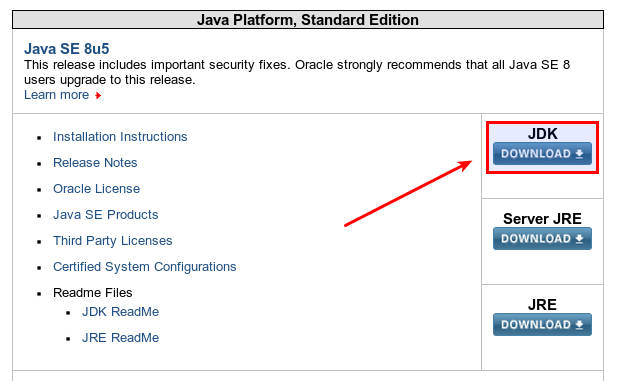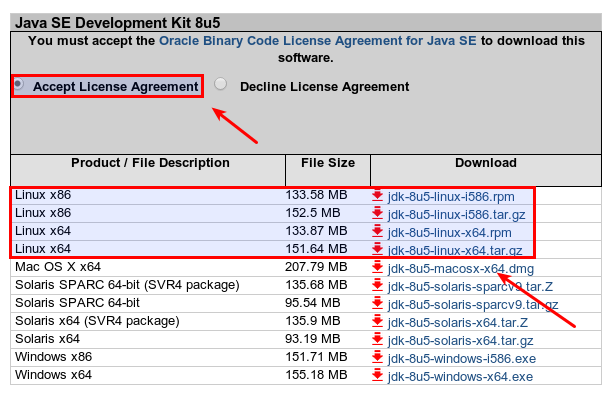How to install Java development kit (JDK) on Linux
Last updated on September 11, 2020 by Dan Nanni
When developing a Java application or a Java-based component, you first need to set up Java development environment. For that, you install JDK on your Linux system. JDK contains a collection of Java programming tools, as well as a complete Java runtime environment.
There are two options to install JDK on Linux: Oracle JDK or OpenJDK. The latter is open-source implementation of Oracle's Java SE platform. Choose either one you prefer, as described in the following.
Install Oracle JDK on Linux
Go to Oracle website, and click on JDK Download link.

On the next page, you must accept Oracle license agreement. Then download JDK according to your Linux system:

- For Non-RPM based Linux (e.g., Debian, Ubuntu, Mint):
jdk-8u5-linux-i586.tar.gz(32-bit) orjdk-8u5-linux-x64.tar.gz(64-bit) - For RPM-based Linux (e.g., CentOS, Fedora, RHEL):
jdk-8u5-linux-i586.rpm(32-bit) orjdk-8u5-linux-x64.rpm(64-bit)
After downloading a JDK file, install it on your Linux system as follows.
To install Oracle JDK on CentOS, Fedora or RHEL:
$ sudo rpm -ivh jdk-8u5-linux-<arch>.rpm
To install Oracle JDK on Debian, Ubuntu or Linux Mint:
$ sudo mkdir -p /usr/java $ sudo tar xvfvz jdk-8u5-linux-<arch>.tar.gz -C /usr/java
After installation, define JAVA_HOME environment variable, and update PATH variable in your .bashrc file.
$ vi ~/.bashrc
JAVA_HOME=/usr/java/jdk1.8.0_05 PATH=$PATH:$JAVA_HOME/bin
$ source ~/.bashrc
Install OpenJDK on Linux
To install OpenJDK on Debian, Ubuntu or Linux Mint, first search for an available OpenJDK package (named openjdk-<version>-jdk) on your system:
$ apt-cache search openjdk
After checking the latest version of OpenJDK, install it with apt-get:
$ sudo apt-get install openjdk-7-jdk
To install OpenJDK on Fedora, CentOS or RHEL, first search for an available OpenJDK package (named java-<version>-openjdk-devel) on your system:
$ yum search openjdk
After checking the latest version of OpenJDK, install it with yum:
$ sudo yum install java-1.8.0-openjdk-devel
After installing OpenJDK, the final step is to define JAVA_HOME environment variable in your .bashrc file.
$ vi ~/.bashrc
JAVA_HOME=/usr/lib/jvm/java-7-openjdk-amd64
$ source ~/.bashrc
Support Xmodulo
This website is made possible by minimal ads and your gracious donation via PayPal or credit card
Please note that this article is published by Xmodulo.com under a Creative Commons Attribution-ShareAlike 3.0 Unported License. If you would like to use the whole or any part of this article, you need to cite this web page at Xmodulo.com as the original source.
Xmodulo © 2021 ‒ About ‒ Write for Us ‒ Feed ‒ Powered by DigitalOcean

